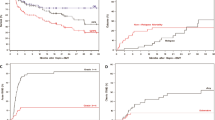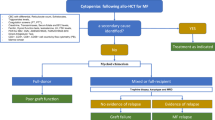Abstract
A total of 46 patients with primary myelofibrosis (PMF) (median age 51 years), underwent an allogeneic hemopoietic SCT (HSCT) after a thiotepa-based reduced-intensity conditioning regimen. The median follow-up for surviving patients is 3.8 years. In multivariate analysis, independent unfavorable factors for survival were RBC transfusions >20, a spleen size >22 cm and an alternative donor—24 patients had 0–1 unfavorable predictors (low risk) and 22 patients had 2 or more negative predictors (high risk). The overall actuarial 5-year survival of the 46 patients is 45%. The actuarial survival of low-risk and high-risk patients is, respectively, 77 and 8% (P<0.0001); this is because of a higher TRM for high-risk patients (RR, 6.0, P=0.006) and a higher relapse-related death (RR, 7.69; P=0.001). In multivariate Cox analysis, the score maintained its predictive value (P=0.0003), even after correcting for donor–patient age and gender, Dupriez score, IPSS (International Prognostic Scoring System) score pre-transplant and splenectomy. In conclusion, PMF patients undergoing an allogeneic HSCT may be scored according to the spleen size, transfusion history and donor type; this scoring system may be useful to discuss transplant strategies.
This is a preview of subscription content, access via your institution
Access options
Subscribe to this journal
Receive 12 print issues and online access
$259.00 per year
only $21.58 per issue
Buy this article
- Purchase on Springer Link
- Instant access to full article PDF
Prices may be subject to local taxes which are calculated during checkout


Similar content being viewed by others
References
Tefferi A . Myelofibrosis with myeloid metaplasia. N Engl J Med 2000; 342: 1255–1265.
Dupriez B, Morel P, Demory JL, Lai JL, Simon M, Plantier I et al. Prognostic factors in agnogenic myeloid metaplasia: a report on 195 cases with a new scoring system. Blood 1996; 88: 1013–1018.
Cervantes F, Barosi G, Demory JL, Reilly J, Guarnone R, Dupriez B et al. Myelofibrosis with myeloid metaplasia in young individuals: disease characteristics, prognostic factors and identification of risk groups. Br J Haematol 1998; 102: 684–690.
Dingli D, Schwager SM, Mesa RA, Li CY, Tefferi A . Prognosis in transplant-eligible patients with agnogenic myeloid metaplasia: a simple CBC-based scoring system. Cancer 2006; 106: 623–630.
Vannucchi AM, Antonioli E, Guglielmelli P, Pardanani A, Tefferi A . Clinical correlates of JAK2V617F presence or allele burden in myeloproliferative neoplasms: a critical reappraisal. Leukemia 2008; 22: 1299–1307.
Guardiola P, Anderson JE, Bandini G, Cervantes F, Runde V, Arcese W et al. Allogeneic stem cell transplantation for agnogenic myeloid metaplasia: a European Group for Blood and Marrow Transplantation, Sociètè Francaise de Greffe de Moelle, Gruppo Italiano per il Trapianto di Midollo Osseo and Fred Hutchinson Cancer Research Center Collaborative Study. Blood 1999; 93: 2831–2838.
Deeg HJ, Gooley TA, Flowers ME, Sale GE, Slattery JT, Anasetti C et al. Allogeneic hematopietic stem cell transplantation for myelofibrosis. Blood 2003; 102: 3912–3918.
Kerbauy DMB, Gooley TA, Sale GE, Flowers ME, Doney KC, Georges GE et al. Hematopoietic cell transplantation as curative therapy for idiopathic myelofibrosis, advanced polycythemia vera and essential thrombocythemia. Biol Blood Marrow Transplant 2007; 13: 355–365.
Guardiola P, Anderson EA, Gluckman E . Myelofibrosis with myeloid metaplasia. N Engl J Med 2000; 343: 659–660.
Daly A, Song K, Nevill T, Nantel S, Toze C, Hogge D et al. Stem cell transplantation for myelofibrosis: a report from two Canadian centers. Bone Marrow Transplant 2003; 32: 35–40.
Ditschkowski M, Beelen DW, Trenschel R, Koldehoff M, Elmaagacli AH . Outcome of allogeneic stem cell transplantation in patients with myelofibrosis. Bone Marrow Transplant 2004; 34: 807–813.
Rondelli D, Barosi G, Bacigalupo A, Prchal JT, Popat U, Alessandrino EP et al. Allogeneic hematopoietic stem-cell transplantation with reduced-intensity conditioning in intermediate- or high-risk patients with myelofibrosis with myeloid metaplasia. Blood 2005; 105: 4115–4119.
Kroger N, Zabelina T, Schieder H, Panse J, Ayuk F, Stute N et al. Pilot study of reduced-intensity conditioning followed by allogeneic stem cell transplantation from related and unrelated donors in patients with myelofibrosis. Br J Haematol 2005; 128: 690–697.
Snyder DS, Palmer J, Stein AS, Pullarkat V, Sahebi F, Cohen S et al. Allogeneic hematopoietic cell transplantation following reduced intensity conditioning for treatment of myelofibrosis. Biol Blood Marrow Transplant 2006; 12: 1161–1168.
Devine SM, Hoffman R, Verma A, Shah R, Bradlow BA, Stock W et al. Allogeneic blood cell transplantation following reduced-intensity conditioning is effective therapy for older patients with myelofibrosis with myeloid metaplasia. Blood 2002; 99: 2255–2258.
Merup M, Lazarevic V, Nahi H, Andreasson B, Malm C, Nilsson L et al. Different outcome of allogeneic transplantation in myelofibrosis using conventional or reduced-intensity conditioning regimens. Br J Haematol 2006; 135: 367–373.
Barosi G, Viarengo G, Pecci A, Rosti V, Piaggio G, Marchetti M et al. Diagnostic and clinical relevance of the number of circulating CD34(+) cells in myelofibrosis with myeloid metaplasia. Blood 2001; 98: 3249–3255.
Tefferi A, Thiele J, Orazi A, Kvasnicka HM, Barbui T, Hanson CA et al. Proposals and rationale for revision of the World Health Organization diagnostic criteria for polycythemia vera, essential thrombocythemia, and primary myelofibrosis: recommendations from an ad hoc international expert panel. Blood 2007; 110: 1092–1097.
Barosi G, Ambrosetti A, Finelli C, Grossi A, Leoni P, Liberato NL et al. The Italian Consensus Conference on Diagnostic Criteria for Myelofibrosis with Myeloid Metaplasia. Br J Haematol 1999; 104: 730–737.
Cervantes F, Dupriez B, Pererira A, Passamonti F, Reilly JT, Morra E et al. New prognostic scoring system for primary myelofibrosis based on a study of the International Working Group for Myelofiobrosis Research and Treatment. Blood 2009; 113: 2895–2901.
Raiola AM, van Lint MT, Lamparelli T, Gulandi F, Mordini N, Berisso G et al. Reduced-intensity thiotepa-cyclophosphamide conditioning for allogeneic haemopoietic stem cell transplants (HSCT) in patients up to 60 years of age. Br J Hematol 2000; 109: 716–721.
Przepiorka D, Weisdorf D, Martin P, Klingemann HG, Beatty P, Hows J et al. 1994 Consensus Conference on Acute GVHD grading. Bone Marrow Transplant 1995; 15: 825–828.
Sullivan KM, Agura E, Anasetti C, Appelbaum F, Badger C, Bearman S et al. Chronic graft-versus-host disease and other complications of bone marrow transplantation. Semin Hematol 1991; 28: 250–259.
Ciurea SO, Sadegi B, Wilbur A, Alagiozian-Angelova V, Gaitonde S, Dobogai LC et al. Effects of extensive splenomegaly in patients with myelofibrosis undergoing a reduced intensity allogeneic stem cell transplantation. Br J Haematol 2008; 141: 80–83.
Patriarca F, Bacigalupo A, Sperotto A, Isola M, Soldano F, Bruno B et al. Allogeneic hematopoietic stem cell transplantation in myelofibrosis: the 20-year experience of the Gruppo Italiano Trapianto di Midollo Osseo (GITMO). Haematologica 2008; 93: 1514–1522.
Barosi G, Bacigalupo A . Allogeneic hemopoietic stem cell transplantation for myelofibrosis. Curr Opin Hematol 2006; 13: 74–78.
Acknowledgements
This work was supported, in part, by the Associazione Italiana Ricerca contro il Cancro (AIRC-Milano) and the Fondazione Ricerca Trapianto Midollo Osseo (FARITMO).
Author information
Authors and Affiliations
Corresponding author
Rights and permissions
About this article
Cite this article
Bacigalupo, A., Soraru, M., Dominietto, A. et al. Allogeneic hemopoietic SCT for patients with primary myelofibrosis: a predictive transplant score based on transfusion requirement, spleen size and donor type. Bone Marrow Transplant 45, 458–463 (2010). https://doi.org/10.1038/bmt.2009.188
Received:
Revised:
Accepted:
Published:
Issue Date:
DOI: https://doi.org/10.1038/bmt.2009.188
Keywords
This article is cited by
-
Pretransplant hepatomegaly is linked to relapse in patients with leukemia and myelodysplastic syndrome not in remission
International Journal of Hematology (2024)
-
Spleen volume and length determined by computed tomography impact outcome after allogeneic stem cell transplantation for myelofibrosis
Bone Marrow Transplantation (2023)
-
Splenic irradiation prior to allogeneic hematopoietic cell transplantation for patients with myelofibrosis
Bone Marrow Transplantation (2023)
-
Pretransplant spleen volume and outcome after hematopoietic stem cell transplantation (HSCT) in patients with acute myeloid leukemia (AML)
Annals of Hematology (2023)
-
Predicting the outcome for patients with myelofibrosis undergoing an allogeneic hemopoietic stem cell transplant
Blood Cancer Journal (2022)



